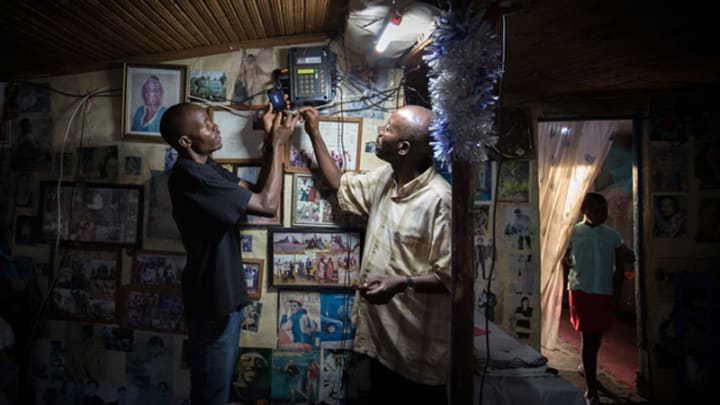
WASHINGTON — Power Africa 2.0, an updated strategy for the United States government initiative focused on improving energy access in Africa, launched last week. Administration officials describe the strategy as an evolution of Power Africa’s work, rather than a dramatic departure from what it has done in the past.
The strategy will ensure that Power Africa continues to develop innovative ideas and enterprise-driven approaches to help expand power opportunities, U.S. Agency for International Development Administrator Mark Green said in a speech announcing the update.
“Under Power Africa 2.0, we will be expanding beyond our previous targets of increased energy generation and access and looking to make gains in the areas of distribution and transmission,” Green said. “And perhaps most importantly, we will be taking on the enabling environments that allow private enterprise to grow and thoroughly flourish.”
See more related topics:
► Opinion: We need to build the 'power grid of the future' today. Here's how.
► Power Africa: Deals or development? 5 questions for the US government
As staff in the administration have learned about Power Africa throughout the past year, they have come to believe in its mission and endorse its work, Andrew Herscowitz, the Power Africa coordinator, told Devex.
Power Africa has brought more than 80 projects, worth more than $14 billion total, to financial close, with a total of $54 billion in commitments. In those deals, on average, for every dollar the U.S. government has put in, the private sector has invested between $50 and $100, he said.
Thus far, Power Africa has focused largely on spurring power generation. What’s needed now to complement those efforts is to ensure that as countries bring new power capacity online, they can effectively deliver it to citizens and businesses, Herscowitz said. Countries sometimes don’t have the necessary transmission and distribution systems, which are expensive problems to solve and presents some key challenges, he added.
One thing that drove this shift is Power Africa’s experience in Nigeria, where repeated breakdowns in the distribution and transmission systems create huge power challenges. Power Africa put teams into four distribution companies in Nigeria to help them reduce their losses through better practices, which aided those companies in recovering about $80 million in revenue that they can now invest in their systems, or in getting more customers access to electricity.
The shift in focus doesn’t mean Power Africa will stop investing in generation, Herscowitz said. Rather, there will be a pause on the generation front so that they can work on ensuring that all the pieces are in place to bring access to electricity to the 600 million people on the continent who still lack access.
Distribution can be a challenging proposition. In Kenya, for example, distribution companies connected about 3 million customers at a high cost, and about a million of them are not paying for power, he said.
“We have to look at what went wrong, not think these are bad customers,” Herscowitz said. “The business model needs to change.”
There is a lot that the off-grid and on-grid electricity companies can learn from one another, Herscowitz said. Off-grid solar companies have found that leasing appliances, or rent-to-own schemes help boost demand for the electricity they are selling. With distribution companies, it’s possible that the reason customers don’t pay is not because they can’t afford to but because companies have not helped generate the demand.
Here, the U.S. rural electrification model might provide a useful example, he said. In the U.S., as rural areas were electrified through local cooperatives, appliance circuses came to town where people could buy washing machines and the like, often on credit, which created demand for the newly available power and helped increase consumption.
On the distribution front, Power Africa’s strategy will be to replicate what’s worked in Nigeria — it will send teams to help distribution companies reduce losses, increase revenues, and rethink business models.
Power Africa is also exploring the potential of microgrids, which are generally not yet commercially viable, he said. As part of that effort, Power Africa, along with MasterCard and other partners, launched the Smart Communities Coalition in January, which will provide electricity and other benefits to five refugee settlements in East Africa. It also provides a chance to test microgrid models and hopefully, he said, translate that knowledge to other areas. Power Africa will also look at how it can support grants that will help stimulate the industry, he said.
In this next phase, Power Africa will focus on improving enabling environments, making sure utilities are strengthened and bolstering fair and transparent procurement processes. It will also be doing more U.S. outreach to help U.S. companies see the opportunities that exist in Africa, Herscowitz said.
Power Africa still has strong support in Congress, and while budgets are not finalized, Herscowitz said the initiative never intended to operate with a huge budget, and has “learned a lot about how to gain more efficiencies, how to be more targeted,” and continues to try to bring more money in from partners.
If its budget is cut, there will be strategies they might have turned to in the past — such as seeding investment funds, or helping governments pay for legal counsel for contract negotiations — that they may no longer be able to do, but Power Africa will continue to deliver, Herscowitz said.




